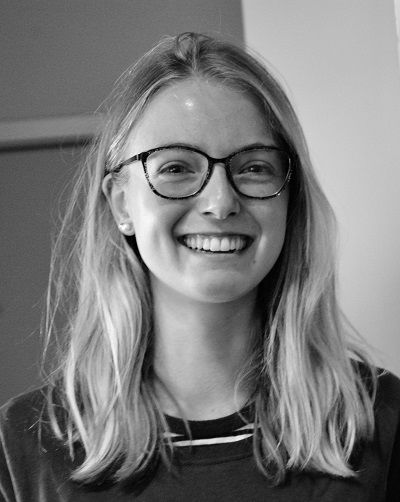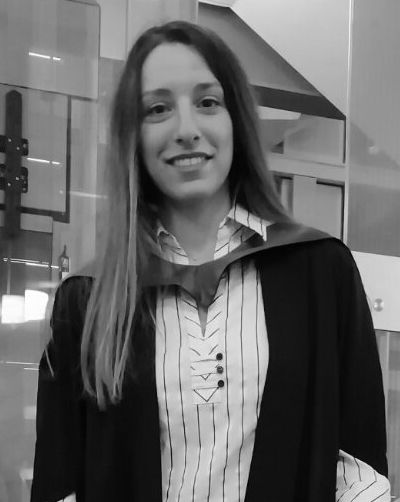Claire Jones was a PhD student at the University of Edinburgh from 1985-89, where after she went on to work as a Research Fellow in the University's Department of Computer Science.
In honour of Claire Jones, a previous member of the Adelard team and a pioneer in the industrial application of formal methods, we actively promote the advancement of great female minds in the area of Computer Science.
Adelard sponsors the prize for the Best Performing Female MSc Student at the University of Edinburgh. This prize recognises the talent, knowledge and tremendous efforts of those who will no doubt go onto make significant contributions to the world after the completion of their degree.
Claire Jones prize 2023 winner
On the 23rd November 2023, Izzy Sebire was awarded the Claire Jones prize as the Best Performing Female MSc Student at The University of Edinburgh's School of Informatics.
Izzy completed an MSc in Artificial Intelligence. Her thesis ‘Faithfulness and Content Selection in Long-Input Multi-Document Summarisation of U.S. Civil Rights Litigation’, broadly aims to contribute towards a trustworthy methodology for AI-enabled summarisation of real-world legal text, focusing on U.S. civil rights cases. This is a realistic and challenging summarisation scenario requiring understanding and synthesis of the key events in a legal case.
Legal text has unique complexities, and the text to be summarised for each case can extend to thousands of pages over multiple long documents. Automatic summarisation of legal cases would therefore reduce the burden on legal professionals and promote access to justice by providing case law information in a shorter and more understandable format.
While generative language models can be used to produce such summaries, the ability to generate novel text introduces the possibility that (potentially plausible sounding) content which is not supported by the source text is included in the summary. This problem is called hallucination and creates a major barrier to practical applicability. Izzy’s thesis investigates this problem and presents the first study at the intersection of legal, multi-document, and faithful summarisation, by studying the impact of content selection, legal pretraining, and planning through entity chaining on the quality and faithfulness of summaries of U.S. civil rights cases generated using the PEGASUS model.
Read Izzy's thesis here.

Claire Jones prize 2022 winner
On the 24th November 2022, Miriam Beddig was awarded the Claire Jones prize as the Best Performing Female MSc Student at The University of Edinburgh's School of Informatics.
Miriam completed an MSc in Computer Science. Her thesis "Variational Quantum Algorithms for the Gaussian Mixture Model on Coresets" investigates how well the coreset technique works for the Gaussian Mixture model.
Even though classical computers are nowadays very powerful, some compute-intensive tasks, such as Machine Learning tasks, can still be infeasible due to the large input size of the data sets. To reduce the complexity, one possible solution is the usage of quantum computers. Quantum computing gained a lot of interest, since there exist quantum algorithms that have significantly lower time complexities for certain problems than their classical counterpart. However, current quantum devices are error-prone and very limited in their size.
To overcome the current limitations of quantum devices, one approach is to use so-called hybrid algorithms where the idea is to let a quantum computer and a classical computer solve a problem working together. In practice, this usually means that most of the computations are still performed on a classical computer, but small subroutines are pushed to a quantum computer. To gain an advantage over completely classical algorithms, these subroutines contain computations that can be computed efficiently on a quantum device but not on a classical device.
In her dissertation, Miriam used variational quantum algorithms - a certain class of hybrid algorithms. These are restricted in the size of the input due to the current limitations of quantum devices. To overcome this issue, Miriam considered the coreset technique which reduces a large data set to a representative smaller data set. The coreset then served as an input to variational quantum algorithms. This technique has been applied to estimate the parameters of the Gaussian Mixture Model. This model is a probabilistic model that is often used to find clusters of a data set.
Claire Jones prize 2021 winner
On the 30th November 2021, Christina Ovezik was awarded the Claire Jones prize as the Best Performing Female MSc Student at The University of Edinburgh's School of Informatics.

Claire Jones prize 2020 winner
On the 30th November 2020, Pia Siegele was awarded the Claire Jones prize as the Best Performing Female MSc Student at The University of Edinburgh's School of Informatics.
Pia completed an MSc in Cognitive Science. In her thesis “The Influence of Synaptic Remodelling on Neuronal Network Activity and Function” Pia used computational modelling techniques to investigate the dynamics of neuronal networks in the brain. More specifically, she was interested in understanding how neuronal networks maintain stable activity and function, despite the fact their components (the neurons and synapses) constantly change. Computational studies such as these provide insights into the principles of brain function in health and disease, and are of interest for the development of biologically inspired artificial neural networks.
You can access Pia’s work via the list of outstanding projects: https://project-archive.inf.ed.ac.uk/msc/2020-outstanding.html

Claire Jones prize 2019 winner
On the 23rd November 2019, Dimitra Giantsidi was awarded the Claire Jones prize as the Best Performing Female MSc Student at The University of Edinburgh's School of Informatics.

Claire Jones prize 2018 winner
On 29th November 2018, Carolin Scholl was awarded the Claire Jones prize by University of Edinbugh’s Head of School at the Informatics Forum.
Carolin Scholl was studying toward an Artificial Intelligence MSc degree and recently completed her thesis, “Pruning over-representations in stochastic latent encoder models”. Her thesis can be found via the list of outstanding projects https://project-archive.inf.ed.ac.uk/msc/2018-outstanding.html
For more information please contact us.
